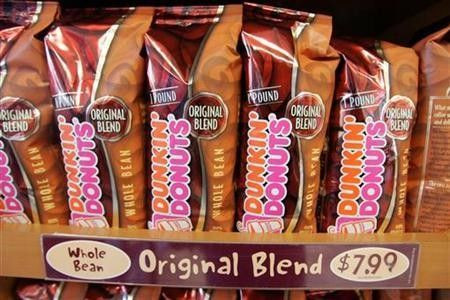Dunkin’ Donuts (DNKN) Invades The UK: Will It Succeed?

Dunkin’ Donuts, the flagship brand of Dunkin Brands Group Inc. (Nasdaq:DNKN), announced on Thursday plans to open up in the United Kingdom, despite an earlier exit from the country in the 1990s and tough existing competition from coffee shops there.
The major donut and coffee chain has signed agreements with two franchise groups, which will open 50 Dunkin’ Donuts stores in North and East London over the next five years.
Other discussions with business partners could bump that figure up to 150 U.K. stores in the next five years.
There is already a competitive market for coffee chains in the U.K., with established top brands like Starbucks Corporation (Nasdaq:SBUX), Whitbread PLC (LON:WTB)’s Costa Coffee, and Caffè Nero Group Ltd. dominating the market, said food and drinks researcher Kiti Soininen, of London’s Mintel Group Ltd, to International Business Times.
But there’s still reasonable consumer demand, more than expected coming off a tough recession, she said.
“The problem is that with the coffee shop market as it stands, there are a number of quite big players, with quite good momentum,” she told IBTimes. “It’s not going to be the easiest market to enter.”
Costa Coffee already boasts 1,300 stores, while Starbucks owns over 700 and Caffe Nero about 500 stores, according to 2012 Mintel research. That far outstrips Dunkin’s 50 planned outlets.
But Dunkin’ Brands International President Giorgio Minardi isn’t too deterred by the tough competition. He told IBTimes in an email that coffee, other espresso drinks and sandwiches are expected to be especially popular in the U.K.
“We now also have a greater menu focus on beverages, all-day snacking and better-for-you menu items,” he wrote.
Donuts do also seem to be taking off in the U.K., at least of late, said Soininen, though it’s unlikely Dunkin’ will arrive in time to benefit.
“We’ve had a bit of a donut boom in here, over the last 18 months thereabouts,” said Soininen, who noted gourmet donuts and even "cronuts" have become popular among local bakeries and supermarkets in 2013.
The local coffee shop market is worth about 1.3 billion pounds ($2 billion) in 2013, according to Mintel.
Dunkin’ left the U.K. in the mid-1990s, according to the Wall Street Journal, and only owns 100 European stores, compared to its global portfolio of 10,500 restaurants in 31 countries.
Dunkin’ CEO Nigel Travis told the Journal that Dunkin’s previous U.K. effort focused on donuts, a push which failed at the time. Now, a diverse and locally relevant menu, in a flourishing coffee industry, will help Dunkin’ succeed, he said.
Dunkin’ also previously left Russia in 1999, only to re-enter in 2010.
According to Minardi, the company also left Brazil in the mid-2000s, only to plan another return just this summer. Active recruitment of franchisees in Brazil is ongoing, with a target of about 20 stores in three cities, he told IBTimes.
International sales account for just over 20 percent of the company’s revenues. Comparable international sales declined slightly in the latest quarter.
Dunkin’ has done especially well in Korea and Southeast Asia, said Minardi, with Korea’s over 900 stores serving as the company’s largest international market.
The economic climate in the U.K. and broader Europe may also be favorable to the company, though the continent is only recently emerging from a long recession.
“We feel very good about entering the U.K. at this time,” wrote Minardi, also citing recent announced expansions in Germany, with 50 stores in the next six years.
Consumer confidence in the U.K. has been improving in the last four months, said Soininen, but it’s hard to say whether upbeat sentiment can withstand storms like serious bad weather or major bad news.
U.K. incomes are set to rise only gradually, on the back of falling inflation and increased productivity, according to a note from London’s Capital Economics on Thursday.
Analysts from Citigroup Inc. (NYSE:C) and Barclays PLC (LON:BARC) found Dunkin’s latest corporate earnings encouraging, driven mostly by strong U.S. sales trends.
“We're now plowing as much money as we can into international because we think international can really be a strong business,” said CEO Travis, on the firm’s latest earnings call.
© Copyright IBTimes 2024. All rights reserved.





















